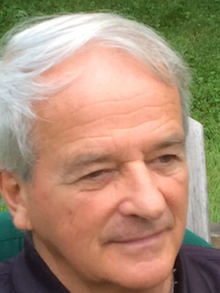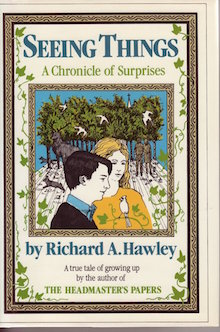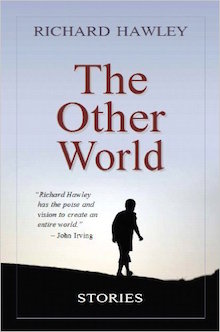The Three Lives of Jonathan Force (Fomite Press, February 2016) is a big novel, one that tells the story of one man’s life from beginning to end, a project that took you decades to complete. Over the years, you’ve published portions as single short stories and a volume of linked stories. You considered publishing Jonathan’s story in three separate novels, finally settling on one novel that includes three books. Can you recall the very first moment you decided to embark on this vast project that has taken so many turns?

Photo by M.A. WatsonI’m not sure I can identify an actual trigger moment that started me on this project. But about twenty years into my work teaching and coaching and counseling in a boys’ school, contending with all that unfurling, I knew I wanted to capture the essence of it. My first impulse was to celebrate all that energy and impulsiveness and uncool striving, but at the same time something like grief was at work: grief that circumstances, including the requirements of schooling, were chafing the boy-ness out of the boys. This realization, part wonder, part guilt, carried me back to my own boyhood and schooling — and, literally everything came back.
So I guess the genesis of this book is the moment I realized I no longer wanted to shape or improve the boys, but instead to be an alert, appreciative witness to what was most alive in them.
When did the idea to be an “alert, appreciative witness” to boys’ “unfurling” — great word — expand to include the entire arc of a man’s life?
I have been immersed in boyhood — both in the boyhood exuberantly close at hand in my work and in the reconsideration of my own — throughout the course of my adult life. I followed what might be called the maturation of many of the boys I knew into what seemed to me impostures: credible approximations of what the civic order might expect of a business executive or an attorney, of a club-able suburbanite, of a family man. These poses were assumed with what seemed like terrific psychic effort. There was an unease about these outwardly successful men, nothing that felt to me like happiness.
 Observing this was of course an invitation to examine my own adaptations and compromises, which was revelatory. It helped that beginning in middle life I was reading a lot of Jungian writing. One writer, Robert Johnson, is especially good on the deep nature of masculinity and femininity. One of his books, Transformations, proposes that there are three stages of a fully realized man’s life. In the first the boy — every boy — is a kind of spirited fool, like the eponymous Parsifal of legend or Don Quixote. Such boys can inspire and energize others but they are not quite in the real world. Boys who grow past this condition, young men who become practically shrewd and “real,” tend to make their way intellectually and materially, but in forsaking their boyhood illusions, they lose heart. They become jaded and world-weary, like Hamlet. But Hamlets can transcend this condition, Johnson maintains, if they have the courage to put aside their certainties and follow insistent urges, even dark ones, to a fuller realization of who they are and their place in the world, like Goethe’s Faust.
Observing this was of course an invitation to examine my own adaptations and compromises, which was revelatory. It helped that beginning in middle life I was reading a lot of Jungian writing. One writer, Robert Johnson, is especially good on the deep nature of masculinity and femininity. One of his books, Transformations, proposes that there are three stages of a fully realized man’s life. In the first the boy — every boy — is a kind of spirited fool, like the eponymous Parsifal of legend or Don Quixote. Such boys can inspire and energize others but they are not quite in the real world. Boys who grow past this condition, young men who become practically shrewd and “real,” tend to make their way intellectually and materially, but in forsaking their boyhood illusions, they lose heart. They become jaded and world-weary, like Hamlet. But Hamlets can transcend this condition, Johnson maintains, if they have the courage to put aside their certainties and follow insistent urges, even dark ones, to a fuller realization of who they are and their place in the world, like Goethe’s Faust.
I am an old man now, and this trajectory makes sense to me. I wanted to tell such a story in The Three Lives of Jonathan Force. And while I believe all of us live something like discrete, successive lives, there is in my case, and in Jonathan’s, the unifying force of boyhood, burning like a steady fuse for as long as we live.
You write with real grace about the interior life. What is particularly wondrous to me is how you retrieve the world of childhood with stunning authenticity. How do you clear away the silt of adult understandings and perceptions to access that world?
First, I am heartened that you found young Jonathan’s voice authentic. For if it is not, the enterprise is lost. The only way I know how to convey a character’s voice is through a combined process of deep meditation and recollection. Like a certain kind of actor, I cannot begin until I am able to inhabit the character I am writing, think like him, wear his clothes.
 Years ago I wrote a memoir called Seeing Things. I had not at the time made any special mark in the world that would call for a published memoir, but it was not that kind of a book. What I wanted to document, before I got too old to summon it up, was a kind of boyhood experience, often just a second or two in length, that carried me right out of the material world into an ecstatic sense of connectedness to everything around me. In the process of narrating those experiences I found that I fell easily into the childhood psychic state when they occurred. I did not have to remember what happened; I just reentered the scene.
Years ago I wrote a memoir called Seeing Things. I had not at the time made any special mark in the world that would call for a published memoir, but it was not that kind of a book. What I wanted to document, before I got too old to summon it up, was a kind of boyhood experience, often just a second or two in length, that carried me right out of the material world into an ecstatic sense of connectedness to everything around me. In the process of narrating those experiences I found that I fell easily into the childhood psychic state when they occurred. I did not have to remember what happened; I just reentered the scene.
Jonathan Force is a novel, not a memoir or a veiled autobiography. But to find Jonathan’s boyhood voice, I began with events and circumstances fairly close to my own as an infant. Once the spark of that identity caught fire, I was able to proceed seeing what Jonathan saw, saying what he would say.
Why did you decide to write from Jonathan’s point of view, the first person perspective? The first person perspective implies that the story is being told to someone. To whom is Jonathan telling his story?
Since I am conveying a full life span from earliest sense impression to final breath, the first person voice was essential. I needed access to deep interior feeling. I needed to demonstrate the progress of Jonathan’s self-awareness. For example, in the Second Book, “Knowing it All,” Jonathan proceeds through his undergraduate years at Yale. The personal adjustments he makes are transformative as he comes to understand not only his professional calling but how he processes experience, how he learns. If anyone other than he were telling the story, the narrative would convey the voice and mind of someone intellectually and otherwise farther along than Jonathan, which would distance readers from Jonathan as he is.
And to whom is Jonathan speaking as he journeys through his lives? I think he is talking to the audience each of us addresses in our inner monologues. He is talking to himself. He is talking to Existence itself, to, as the ancient Romans used to say in their prayers, to all the gods there might be.
You’ve been a classroom teacher, a headmaster, a teacher of teachers, and you’ve promoted educational policies, principally in connection to boys’ education, writing extensively on these topics. You’ve also written several novels, many short stories, poetry, and at least one libretto that I know of. Does writing fiction and non-fiction requires different mindsets?
 Very different mindsets. The non-fiction I have published, most of it about children and schools, has required a good deal of research, and three of the books are school histories. These projects require immersion in archives and documents and put one rather in a detective frame of mind as one determines what will be written. How it will be written involves an entirely different set of concerns, and these vary with the intended audience. In my case, audiences for my non-fiction have been mainly parents and educators of developing children. The “mindset” there tends to be one of “sharer of your concerns/reporter from the front.”
Very different mindsets. The non-fiction I have published, most of it about children and schools, has required a good deal of research, and three of the books are school histories. These projects require immersion in archives and documents and put one rather in a detective frame of mind as one determines what will be written. How it will be written involves an entirely different set of concerns, and these vary with the intended audience. In my case, audiences for my non-fiction have been mainly parents and educators of developing children. The “mindset” there tends to be one of “sharer of your concerns/reporter from the front.”
By contrast, my fiction is offered more in a spirit of reaching out to other readers and writers of literary fiction, living and dead, to ask “may I join you?” My non-fiction attempts to inform and instruct. My fiction attempts to explore and to share. That said, I am often surprised to find myself striking exploratory, even whimsical, notes in my non-fiction and didactic notes in my fiction. When I sense too much of the latter going on, I do my best to get rid of it.
While The Three Lives of Jonathan Force is the story of one man’s life from infancy through old age, it is also a novel of ideas. In college Jonathan discovers the power of ideas and goes on to have a career as a public intellectual, the ideas that made his career giving way in his late middle age to new understandings. Does your experience as an educator influence your engagement with ideas in this novel?
My experiences as an educator — I have been a teacher and a school headmaster — have no doubt contributed bits of perspective and incident to the novel’s progression of events, but my school work did not bear on the book’s design and intentions. Like my title character, I have been driven since earliest memory to know what matters most in life. This drive raises a harder question: what constitutes knowing? Even to ask that philosophic question opens up a still bigger question: what is the point of knowing? What is the relationship of knowing to personal fulfillment and happiness?
In Three Lives I wanted to explore in the liveliest way I could one spirited individual’s engagement in those big questions — and their answers.
Jonathan Force is a great name. You, and he, cleverly use his name to title the books that make his career — Force Fields, The Use of Force, Force Factor, and more. Later, another character satirizes Jonathan’s work with books titled Uses of Farce, Reasonable Farce, Farce Fields, etc. Jonathan’s last book Forcible Entries plays on his own work and the satires. Tell me about when you found this man’s name.
I think the idea of force was at work in my plans for this novel even before I named Jonathan or titled the book. I was thinking about force the way Aristotle wrote about physis, the dynamism that drives everything from its potential to its realization: acorn to oak, embryo to man. I wanted to show this force propelling Jonathan through the three stages of his life, like stages of a rocket. Once that was clear in my mind, the name Jonathan Force seemed only fitting, seemed to name exactly what he was.
On any given day, what is your writing process?
On a standard day, a most typical day I will finish a prolonged breakfast, pad upstairs to my study, a converted guest bedroom, flip open the computer lid and stare at the previous day’s output. Then I back up to review how that material has knitted onto what came before it. I am likely to make little revisions in all of this, mostly word changes and cuts. There may be an hour of this before proceeding ahead into new material, which is generated by a bunch of prompts scribbled by hand a day or two prior. In all, four hours or so — I don’t feel bounded by the clock — feels to me an optimal writing session. After four hours I start to feel a little numb and stop trusting the flow. So that would be the process on most days, an hour of review, three hours of new material.
There are striking exceptions to this routine. I find that when I travel for a week or more I often feel a need to reenter a manuscript-in-progress and do something to it. On a number of occasions I have done what I think is significant work in airports, waiting at the gate for my plane. Sometimes I can work productively while in flight, providing it’s a long one. I have had a few productive writing afternoons in quiet bars and also, for some reason, in the pews of Manhattan churches.
What was the first book you fell in love with?
 It’s a dead tie. Hardie Gramatky’s Little Toot and Grimms’ Fairy Tales. My mother read both of them to me when I was four. Little Toot is at once a frightening and heartening story of a personified little tugboat in New York harbor whose careless exuberance makes a lot of trouble. Toot is thus banished to the perilous open seas where he encounters a great liner in distress and tows it to safety, for which he is restored to good graces.
It’s a dead tie. Hardie Gramatky’s Little Toot and Grimms’ Fairy Tales. My mother read both of them to me when I was four. Little Toot is at once a frightening and heartening story of a personified little tugboat in New York harbor whose careless exuberance makes a lot of trouble. Toot is thus banished to the perilous open seas where he encounters a great liner in distress and tows it to safety, for which he is restored to good graces.
The Grimms’ Fairy Tales my mother read from was a musty, outsized volume given to us by my British grandmother. Each tale was preceded by a beautiful color plate in the style of Arthur Rackham. My favorite and often retold tale was “The Brave Little Tailor” about a little boy tailor who was so proud of killing seven flies with one blow, he made a belt celebrating the feat. The legend on the belt — “I killed seven with one blow” — is misinterpreted to mean he has killed seven men with one blow, which leads the tailor off into several trials against giants and other great odds. By his wits and some luck, he prevails and, like Little Toot, is roundly celebrated.
These books, like so many to follow, let me know that Literature was where I wanted to go. Those people knew me.
+++
+